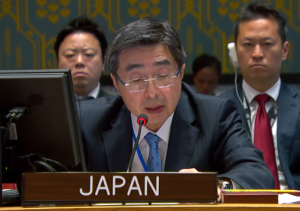シリア情勢に関する安保理会合における石兼大使ステートメント
令和5年6月29日

(As delivered)
Madam President,
I thank Deputy Special Envoy Rochdi and Under-Secretary-General Griffiths for their interventions.
As we have just heard, humanitarian needs in Syria are at an all-time high, with 15.3 million people dependent on aid to survive, 40% more than in 2020. Despite the multiple crises around the world requiring our attention, we cannot forget the voiceless Syrian people in need.
In this regard, State Minister for Foreign Affairs Mr. Yamada attended the Brussels VII Conference, where he reiterated Japan's determination to continue to provide assistance in line with the needs of Syrian citizens and neighboring countries.
Japan also welcomes the recent visit by Under-Secretary-General Martin Griffiths to Syria to discuss humanitarian assistance and early recovery with Syrian leadership.
Yet simply sending relief supplies and supporting early recovery efforts are not enough. Ultimately, without a political solution that addresses the root causes of this long conflict, humanitarian needs will only worsen. For this reason, the status quo is not an option for us.
Japan therefore deeply regrets the lack of movement on the Syrian political track. We reiterate the importance of an inclusive political process as envisioned in Security Council resolution 2254. We call for a renewal of dialogue among all Syrian parties at the Constitutional Committee, including an appropriate handling of the venue issue.
Fellow Council members,
Resolution 2672 expires in 10 days. Cross-border assistance is a lifeline to 4.1 million people in northwest Syria. While we are pleased that the 11th cross-line convoy carrying UN humanitarian supplies has arrived, Japan nonetheless believes this Council must renew the cross-border aid mechanism for at least 12 months, as requested by the Secretary-General.
If we fail to act, the UN would no longer be able to provide funding to NGOs operating in the northwest. The accountability and predictability that are necessary for humanitarian actors and donors would be severely disrupted. More than 80% of the aid to the northwest flows through Bab al-Hawa. Failure to reauthorize the cross-border aid mechanism would be a disaster. Therefore, it is our duty as members of the Council to strive to find common ground in a spirit of compromise.
Madam President,
The six million Syrian refugees represent one of the world’s largest crises, and the burden of hosting them has fallen on neighboring countries and beyond. Yes, these refugees have a right to return to their native country, but conditions for a safe, dignified, and voluntary return are not yet in place.
The UN has noted the need to address economic concerns, including a lack of livelihoods, jobs, and basic services, as well as safety and security concerns. We call for concrete action by the Syrian Government in this regard.
Finally, later today the General Assembly will vote on establishing a new institution to address the issue of missing persons, as was recommended last August by the Secretary-General. We are hoping that the Syrian Government will not reject this initiative from the outset but instead, will sincerely cooperate with the efforts of the international community.
I thank you, Madam President.
